Summary
- Donald Trump uses a meeting with Syria’s interim president, Ahmed al-Sharaa, to call for improved relations with Israel
- The US president urges Sharaa to sign onto the Abraham Accords – learn more about them here – and “tell all foreign terrorists” to leave his country, the White House says
- The brief meeting in Saudi Arabia comes after the US lifted sanctions on Syria – Trump says the move is designed to “give them a chance at greatness”
- On a four-day visit to the Middle East, Trump also addressed a Gulf leaders’ summit earlier – repeating that he wants to strike a deal with Iran, but they must stop “sponsoring terror”
- Trump is now heading to Qatar where he’s due to attend a state dinner
Is Trump allowed to accept $400m luxury plane as a gift?
Currently US officials can accept gifts valued at less than $480 (£363).
Although Donald Trump has referred to the plane ultimately going to his “library”, experts have suggested he really means his museum foundation.
Ex-presidents typically have a library housing their archive of documents, and a museum – typically funded by private donations – full of memorabilia and open to the public.
Experts who BBC Verify spoke to said the fact that the plane could be given to the administration – and not to the president directly – before being transferred to his museum, may not get around the potential violation of the constitution.
The US Justice Department has reportedly drafted a memo explaining why it thinks accepting the jet would be permissible, although this has not been made public.
When White House Press Secretary, Karoline Leavitt was asked about the legality of the deal, she said: “The legal details of that are still being worked out, but of course, any donation to this government is always done in full compliance with the law.”
Trump defends controversial jet gift from Qatar
As Air Force One heads towards Doha, let’s look at some of Donald Trump’s latest comments over his controversial decision to accept a $400m luxury jet as a gift from Qatar.
In an interview with Fox News yesterday, Trump said: “Now, some people say, ‘oh, you shouldn’t accept gifts for the country.’ My attitude is, why wouldn’t I accept the gift? We’re giving to everybody else. Why wouldn’t I accept the gift?”
Trump said he thinks “it is going to be a couple of years” before replacement planes ordered from manufactured Boeing are finished. He added they “will be wonderful when they are finished but that’s a long time”.
Sean Hannity asked the president if the gift had been offered because the US has “paid untold billions and trillions of dollars securing every aspect of the world”.
“We’ve secured that part of the world for many years,” Trump replies before he said that the Qatari plane “helps us out because we will have a relatively new plane instead of having 40-year-old planes”.
What’s happened so far today

Now President Donald Trump is on his way to Qatar, it seems like a good time to recap what has been happening today:
- Trump has met with Syrian President Ahmed al-Sharaa and Saudi Crown Prince Mohammed bin Salman in Riyadh
- Trump urged Sharaa to normalise relations with Israel as he said he hopes Syria will play a pivotal role in trade between the Middle East and the West
- After the meeting, Trump posed for photographs with other Gulf nation leaders before attending the Gulf Cooperation Council Leader’s Meeting
- During the meeting, Trump said he ‘wanted to make a deal with Iran’ and how he wanted to create a ‘thriving’ Middle East

Saudi crown prince waves Trump goodbye
Just before he departed Saudi Arabia, Crown Prince Mohammed bin Salman was on the tarmac to wave Trump goodbye.
Well, more precisely, he was actually standing on a lavender carpet which Saudi Arabia often uses for ceremonies.
Judging by the smile on the bin Salman’s face, it appears he is pleased with how Trump’s visit has gone.
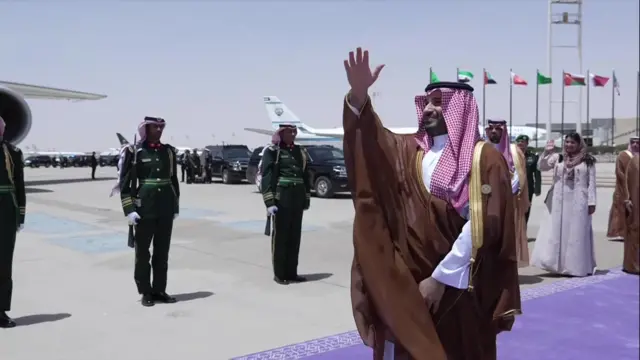
What’s next for Trump?
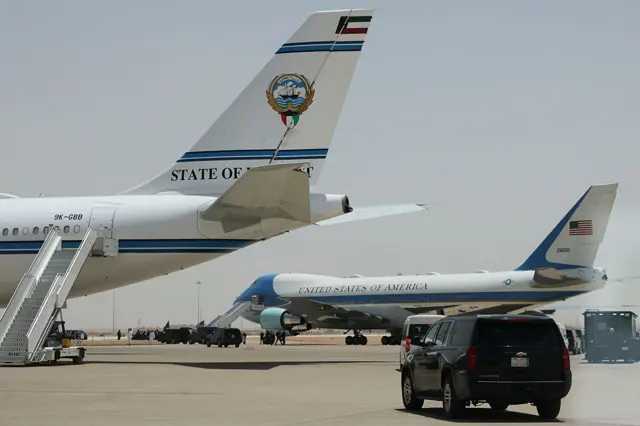
Following the Gulf Cooperation Council summit in Saudi Arabia, Trump is now on a short flight on Air Force One to Qatar for the second leg of his four-day tour of the Middle East.
He is set to be greeted by the Emir Tamim bin Hamad Al Thani at Hamad International Airport in Doha, before travelling to Amiri Diwan – the Qatari leader’s official workplace – for a state visit.
This evening, he will attend a state dinner with Qatari officials at the Lusail Palace.
As mentioned earlier, we will be watching to see if the Qatari royal family follow through with the offer to gift Trump a luxurious plane to use for official travel.
Trump leaves Riyadh – a place that appealed to his royal fascination
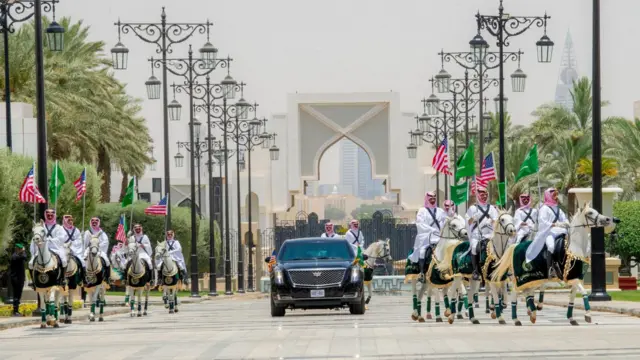
Riyadh was a setting that appealed to Donald Trump on multiple levels – not just his view of himself as the ultimate deal-maker, but of a man who relishes rubbing elbows with the most rich and powerful men in the world.
The lavish welcome from the Saudi delegation was standard for a US president, but would have thrilled him nonetheless. He’s a politician with a penchant for the televisual.
Trump has also had a long-time fascination with royal families – and the power that monarchy confers.
He has joked in the past about being the closest thing America has to a king, and he appears to be enamoured by the British Royal Family in particular. Meanwhile, the jet being offered by the Qataris to replace Air Force One has been described as a “Palace in the Sky”. Fit for a king – or an American president.
Anyone who has seen Trump’s newsy Oval Office appearances over the past three months can’t miss the ever-multiplying amount of ornate gilt-oil paintings and decadent embroidery in the storied room.
Between the Royal Palace here in Riyadh, and the opulent settings awaiting him in Doha and Abu Dhabi, Trump won’t feel out of place a bit.
Trump has boarded Air Force One
President Donald Trump has now boarded Air Force One at King Khalid International Airport in the Saudi capital Riyadh.
Next stop? Qatar.
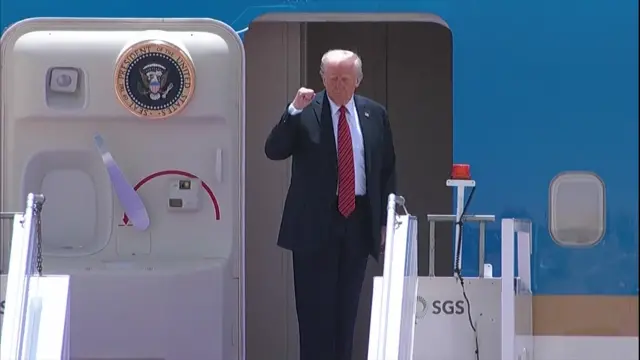
Syrian government notes ‘importance of sanctions being lifted’
In the last few moments the Syrian government has released a statement following the meeting between Donald Trump and Ahmed al-Sharaa this morning. Here’s a summary of their account of the meeting:
- An emphasis was placed on the importance of lifting sanctions imposed on Syria
- Saudi Crown Prince Mohammed bin Salman stressed the necessity to “achieve regional stability”
- Sharaa expressed his gratitude for regional and international support
- Discussions also included “avenues for Syrian-American partnerships in counterterrorism efforts” and “cooperation in eliminating the influence of non-state actors” including the Islamic State group
- A follow-up meeting with Syrian Foreign Minister Asaad al-Shaibani and US Secretary of State Marco Rubio is to be scheduled
Change won’t come with the speed of Trump’s pen
I will always remember the hotel receptionist in Damascus in December after the fall of the Assad regime. He told me, in tears, they didn’t even have enough room cards. “It takes weeks to order them from China,” he said. “We need new friends.”
In December, President Trump had made it clear the US had no interest in Syria.
Now he says Syria’s new allies, Saudi Arabia and Turkey, convinced him to lift punishing sanctions. It helps solidify their ambition to shape a new Syria, and benefit from an expected raft of reconstruction contracts.
Within weeks of taking power, Syria’s interim leader Ahmed al-Sharaa had said Riyadh “has a major role in Syria’s future”.
But change won’t come with the speed of the president’s pen in Saudi.
“Some sanctions can be removed immediately using presidential waivers,” comments Dina Esfandiary of Bloomberg Economics. “But lifting the multi-layered sanctions won’t be easy and will require real commitment by the Trump administration.”
That’s the next test for Syria’s new friends – to keep Trump on track.
The five demands Trump issued to Syria
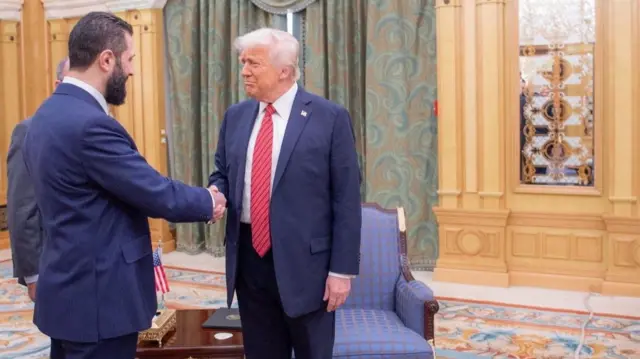
During Trump’s meeting with Syrian transitional President Ahmed al-Sharaa, he gave the leader five instructions, according to White House press secretary Karoline Leavitt:
- To sign the Abraham Accords in order to normalise relations with Israel
- To tell all “foreign terrorists” to leave Syria
- Specifically, Trump singled out “Palestinian terrorists” to be deported
- Assist the United States in stopping the resurgence of the so-called Islamic State group
- And on the same lines, assume the responsibility for detention centres relating to the group in northeast Syria
Sharaa will be buoyed by Trump meeting and US sanctions relief
The meeting between Donald Trump and Ahmed al-Sharaa may have been relatively brief, but the significance is that it has happened at all.
Since toppling Bashar al-Assad from power at the end of last year, Sharaa has been assiduous in trying to convince foreign leaders that he represents a new hope for Syria’s future, despite his jihadist past.
Last week, he took this message to Paris where he met French President Emmanuel Macron.
But meeting the US president represents his biggest coup yet on the world stage.
Syria’s transitional president will be buoyed by Trump’s surprise announcement that US sanctions will be lifted on Syria.
This is seen as essential by the new Syrian authorities if any real lasting progress is to be made – and there’ve been celebrations in Syria at the news.
Not sharing the jubilation is the Israeli government, which still considers Sharaa a jihadist – and has warned that Syrian security forces should not operate south of Damascus.
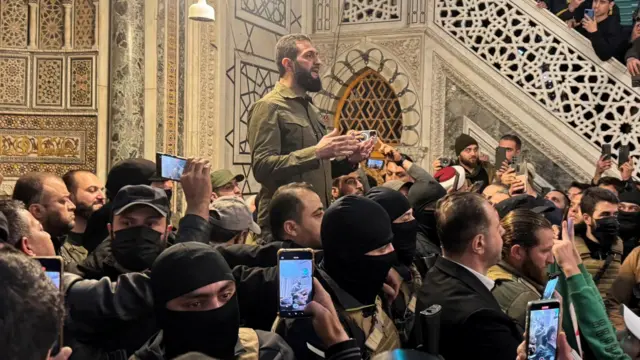
US sanctions on Syria were in place for 46 years
Before Trump announced his intentions to lift US sanctions on Syria yesterday, it had been designated a state sponsor of terrorism since 1979, when deposed dictator Bashar al-Assad’s father, Hafez al-Assad, was president.
Further sanctions and restrictions were placed on Syria in 2003.
Following the start of the Syrian civil war in 2011, the US government ramped up sanctions in an attempt to deprive the regime of the resources it needed “to continue violence against civilians and to pressure the Syrian regime to allow for a democratic transition”.
Sanctions froze assets and interests in property in the US of Syrian officials, including Bashar al-Assad, as well as investments in Syria or the exportation of goods there by US citizens.
Petrol of Syrian origin could also not be imported to the US.
What are the Abraham Accords?
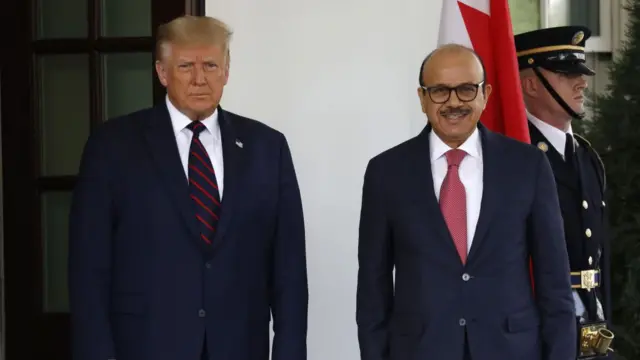
In August 2020, during Trump’s first presidential term, he announced the Abraham Accords from the Oval Office in the White House.
The accords, which Trump helped broker, are designed to normalise relations between other countries and Israel, to gain peace in the Middle East.
The declaration reads that “the best way to address challenges is through cooperation and dialogue and that developing friendly relations among States advances the interests of lasting peace in the Middle East and around the world”.
Initially it was signed by Bahrain and the United Arab Emirates, with Sudan and Morocco agreeing to join later on.
It was a big step forward for relations between Israel and Arab countries, but Israel’s war in Gaza in the wake of Hamas’s deadly 7 October attacks has halted progress in getting other nations to sign on as well.
Trump’s Iran criticism draws condemnation from Tehran
In a speech delivered yesterday at the US-Saudi Investment Forum in Riyadh, President Donald Trump drew sharp contrasts between the economic development of Gulf Cooperation Council countries and what he described as the “mismanagement” and “corruption” of Iran’s leadership.
Trump specifically criticised Iran’s handling of its water crisis, blaming what he called a “water mafia” within the regime – and accused Tehran of siphoning national resources to fund proxy groups across the Middle East.
Despite extending what appeared to be an olive branch to Iran during the same address, Trump’s remarks have provoked an angry response from Iranian officials today.
Iran’s Foreign Minister Abbas Araghchi – who also heads the country’s nuclear negotiations – condemns Trump’s statements as “deceptive”.
Speaking in Tehran, Araghchi attributes Iran’s economic difficulties not to domestic mismanagement, but to US sanctions, placing the blame squarely on the US.
Referring to Washington’s maximum pressure policy against Iran, which was reiterated in Trump’s speech, Araghchi accuses the US president of turning a blind eye to the war in Gaza, in order to name Iran as the regional threat instead of Israel.
In pictures: Trump’s meeting with Gulf leaders
We’ve just received these pictures of President Donald Trump’s appearance at the Gulf Cooperation Council summit in Saudi Arabia, which has just concluded:
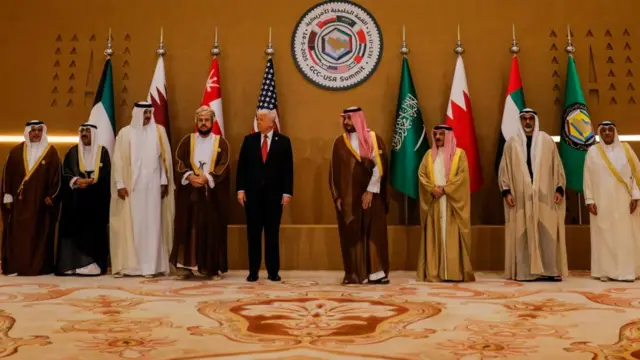
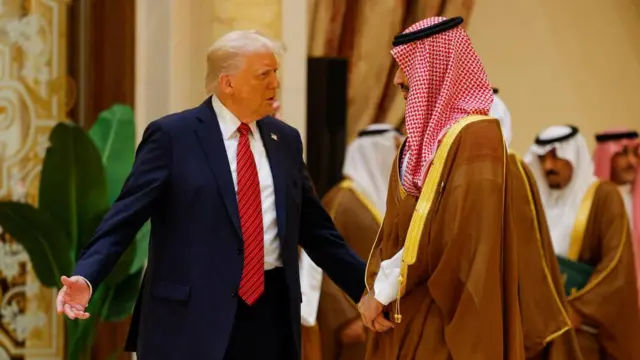
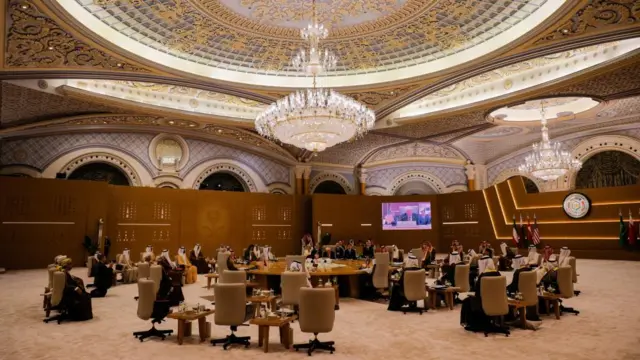
Trump urges Syrian leader to normalise Israel relations during meeting
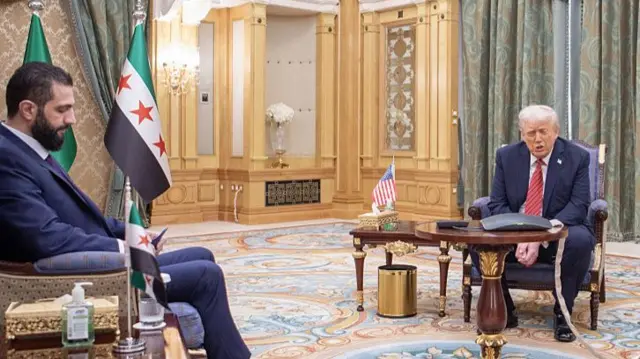
We are now getting more details about the meeting between US President Donald Trump, interim Syrian President Ahmed al-Sharaa, Saudi Crown Prince Mohammed bin Salman and Turkish President Recep Tayyip Erdogan.
White House press secretary Karoline Leavitt says Erdogan and Salman praised Trump for lifting sanctions on Syria. The latter called it “courageous”.
In a post on X, she writes that Trump told Sharaa that “he has a tremendous opportunity to do something historic in his country”.
He also encouraged Syria to sign the Abraham Accords – a US-led initiative for Middle East nations to normalise relations with Israel – and “tell all foreign terrorists to leave Syria”.
The Russia-Ukraine war and the war in Gaza was also discussed, Leavitt adds.
Sharaa told the leaders that he hopes Syria can serve as a critical trade link between the east and west, she adds.
First images from meeting between Trump and Sharaa
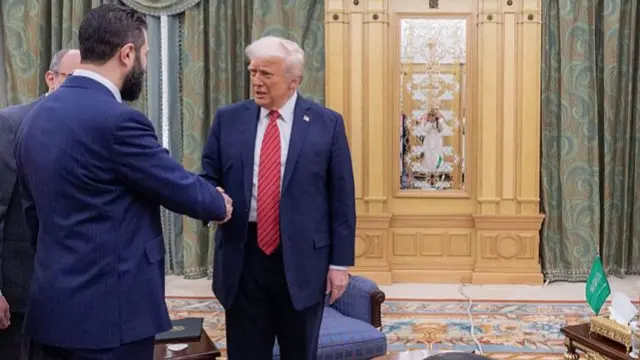
We’re now seeing pictures from the meeting between Donald Trump and Ahmed al-Sharaa earlier.
It was also attended by Saudi Crown Prince Mohammed bin Salman, and the Turkish President Recep Tayyip Erdogan who joined remotely.
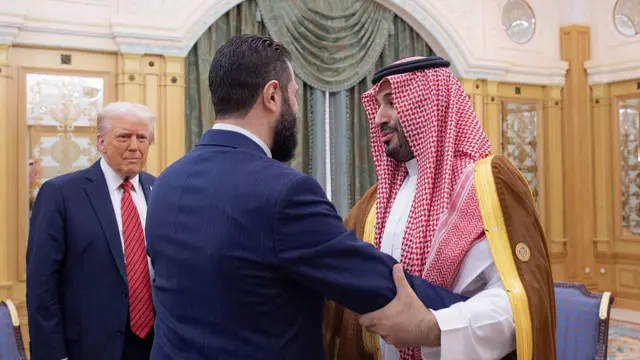
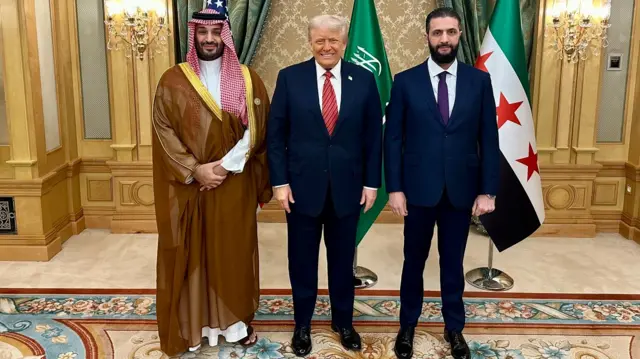
Smiles from Gulf leaders as Trump attacks ‘fake news’ media
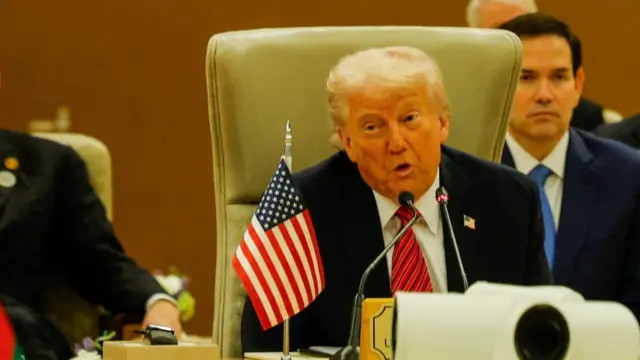
The people in the room for President Trump’s speech were all listening attentively.
There were smiles from of the assembled leaders of Gulf nations when President Trump talks about “the media” and “fake news”.
When Trump says it was “an honour” to meet Saudi Arabia’s Crown Prince, Mohammed bin Salman nodded in agreement.
‘We are going to forge a Middle East that is thriving’, Trump says
Concluding his speech, Trump says the “whole world is talking about what you are doing”.
He insists they are going to forge a Middle East that is “thriving” and the “geographic centre of the world”.
Trump finishes by showering more praise on Mohammed bin Salman, saying it has been “an honour to spend time” with the Saudi crown prince.
Trump says he hopes more countries will normalise relations with Israel
Trump says at the end of his first term, all of the momentum in the Middle East was “towards peace”.
He hopes to continue the progress, he tells the room, calling his election the “most consequential in America in 129 years”.
They will continue to add more countries to the Abraham Accords, he says, for the normalisation of relations with Israel in the region.
He earlier thanked Bahrain and the United Arab Emirates for signing the agreement.
‘My honour to drop Syria sanctions’ – Trump
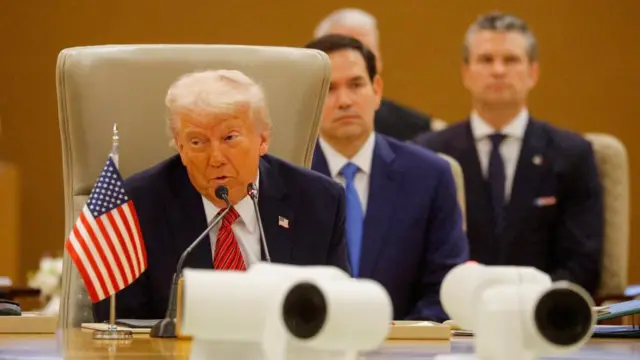
Trump continues his speech by touching on his decision to drop sanctions on Syria.
He says he recently spoke on the phone with Turkish Recep Tayyip Erdogan and adds it is “my honour” to remove the sanctions.
“It’s going to be a good thing,” Trump says. He then says there is a chance too for Lebanon to have “a better future” and one which is “free of Hezbollah grip”.
Trump thanks Arab leaders for efforts to secure peace in Gaza
Trump moves on to the topic of the war in Gaza.
The US president says he hopes for a future of “safety and dignity” for Palestinians, but this cannot happen when the leaders of Gaza continue with violence.
Trump adds that he appreciates the “constructive role that the leaders in this room have taken trying to bring this conflict to an end”.
He also thanks the leaders for helping secure the release of Israeli-American hostage Edan Alexander.
I want to make a deal with Iran, Trump says
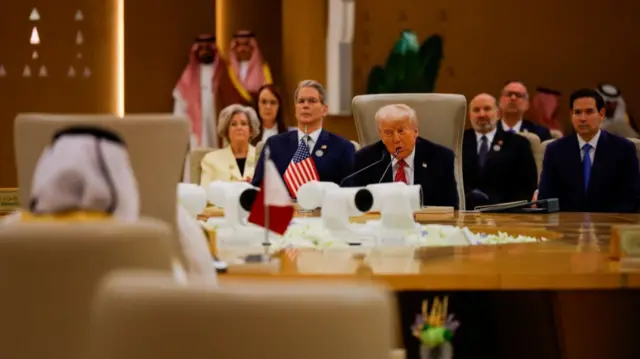
“Many are watching with envy,” Trump tells the assembled Arab leaders – as he says there “are incredible deals within reach for this region”.
Trump then accuses the Biden administration of “creating bedlam by being incompetent”.
The US president says “people at this table know where my loyalties lie”.
He follows this by saying he wants to make a deal with Iran, but in order for that to happen it must “stop sponsoring terror” and “must not have a nuclear weapon”.
Donald Trump making remarks at summit
Donald Trump has begun to speak at the Gulf Cooperation Council in Riyadh.
You can stream it by hitting watch live at the top of the page- and we’ll bring you the key lines here in the feed.
Trump shaking hands with other officials
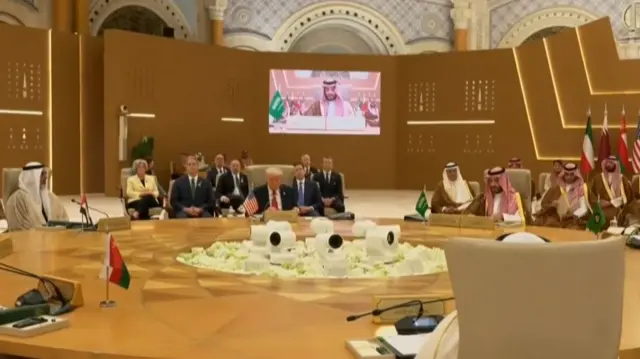
After posing for a quick photo, we’ve just seen pictures of President Trump shaking hands with other officials at the summit.
He has just sat down at a large round table, ready to listen to Saudi Arabia’s Crown Prince Mohammed bin Salman make a speech.
Trump joins summit meeting in Saudi Arabia
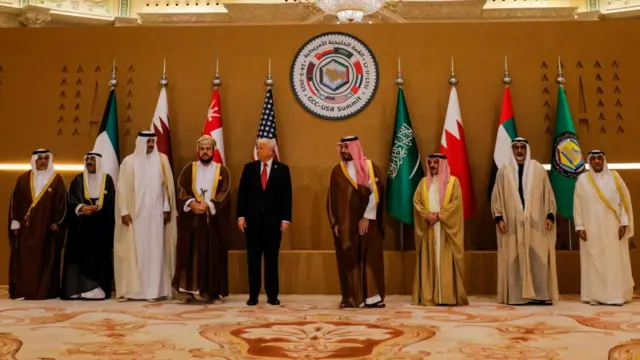
Following the private meeting between the leaders of Syria, Saudi Arabia and Turkey, Donald Trump is now at the Gulf Cooperation Council Summit currently under way in Riyadh
After this, the US president will be heading to Qatar for the second leg of his four-day tour of the Middle East.
Turkish leader joins meeting between Trump and Sharaa
Turkish President Recep Tayyip Erdogan joined the meeting between Donald Trump, Saudi Arabia’s Crown Prince Mohammed bin Salman and Ahmed al-Sharaa remotely, according to Turkish news agency Anadolu.
Why Trump’s meeting with Sharaa matters
Donald Trump’s meeting with Ahmed al-Sharaa presents a key opportunity to strengthen Saudi Crown Prince Mohammed bin Salman’s vision for the future of the Middle East.
The collapse of Bashar al-Assad’s regime in Syria marked a significant defeat for the Islamic Republic of Iran – and a major opportunity for Saudi Arabia to curb Iranian influence in the Arab world.
However, simply removing Assad is not enough to cement Saudi – and Turkish – footholds in Syria.
What both countries need is a stable government under Sharaa’s leadership, one capable of restoring security, facilitating economic recovery and leading the reconstruction of a country devastated by war.
The lifting of fifty-year-old US sanctions against Syria, reportedly at the request of Mohammed bin Salman and Turkish President Recep Tayyip Erdogan, paves the way for substantial Saudi and Turkish investment in Syria.
American companies, particularly in the energy sector, are also expected to benefit from the opening.
Trump’s meeting with Sharaa will go a long way in granting international legitimacy to a man once vilified under his nom de guerre, Abu Mohammad al-Jolani, due to his past links to al-Qaeda.
Trump has met Sharaa in Riyad
US President Donald Trump has met Syrian transitional President Ahmed al-Sharaa in Saudi Arabia, according to reports from the capital Riyadh.
It’s the first time leaders of the two countries have met since 2000, but yesterday Trump’s office said it would just be to “say hello”.
For Syria’s president, today’s Trump meeting caps a remarkable turnaround
Syria’s new president has gone from being a jihadist, with the US offering a $10m reward for his arrest, to shaking hands with President Trump.
The bounty was lifted shortly after Ahmed al-Sharaa’s group, then called HTS, forced Assad out of Syria, amid promises that he would fight so-called Islamic State and form an inclusive government.
Since then, Sharaa is seen as having scored big successes on regional and international levels – especially after his visit to France to meet President Emmanuel Macron.
Now, the US announcement on lifting sanctions has saved Syria from further deterioration, with its wrecked economy in need of a fresh start.
Many are counting on Sharaa’s motivations and regional support, hoping the money will flow into the country to rebuild it, and allow millions of refugees and internally displaced people to rebuild their homes destroyed by Assad’s bombardment.
But some are worried that Sharaa’s government will now be relaxed about ruling the country under its own terms, and will not commit to promises on inclusivity and protecting social freedoms.
Some hardliners among government forces are threatening social freedoms, and are imposing random restrictions on ordinary people’s lives.
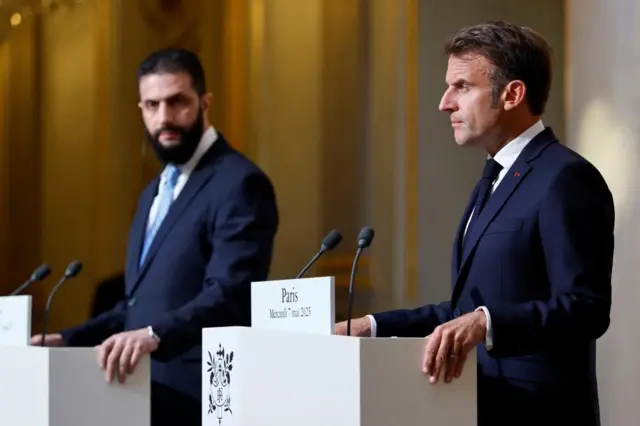
‘For the first time in decades, Syria has hope’
Mouaz Moustafa heads the US-based Syria Emergency Task Force – an organisation that advocated on behalf of the opposition to ousted Syrian dictator Bashar al-Assad.
He tells the BBC World Service’s Newsday programme that President Donald Trump’s plans to briefly meet Syria’s transitional president Ahmed al-Sharaa are a game changer.
“For the first time in decades, Syria has hope,” he says.
Moustafa adds that the war-torn nation now has the chance to become a “prosperous, stable and safe democracy”.
“The Syrian people can rebuild and millions of refugees can return to their homes,” he says.
Meeting between Trump and Sharaa due to take place shortly
We’re seeing reports that Donald Trump will speak to Ahmed al-Sharaa shortly, before of the Gulf Cooperation Council Summit in Riyadh this morning.
Reporters are waiting in the Ritz Carlton hotel ahead of the first diplomatic meeting between a US and Syrian leader in decades.
We’ll bring you any key lines from it here.
Qatar set to roll-out the pomp and pageantry for Trump
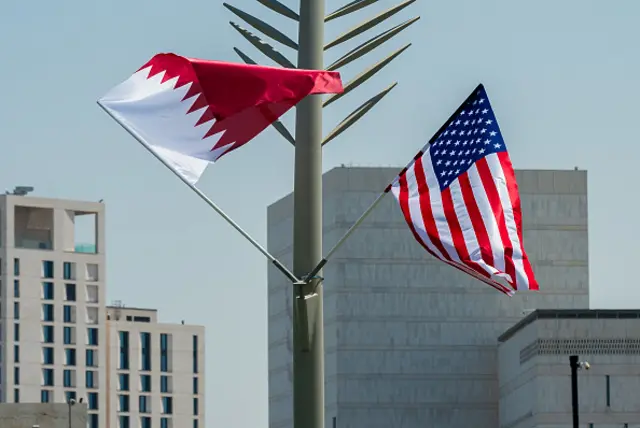
After a busy morning in Saudi Arabia, Trump will then set course for Qatar – where he will be welcomed with more pomp and pageantry at the royal court in Doha.
On this second leg of his whirlwind tour of the Gulf, the US president will be welcomed with a state visit by Emir Sheikh Tamim bin Hamad al-Thani and other officials.
But we’ll also be watching out for whether the Qatari royal family follow through with the offer to gift Trump a much newer and more luxurious plane to use for official travel.
It is a present which has provoked huge controversy back in America among people who wonder what the Qatar wants in return.
Joyous Syrians say sanctions being lifted an ‘indescribable feeling’
The US government has imposed wide-ranging sanctions on Syria for decades, affecting things from aid to finances.
There were spontaneous and joyous public celebrations in the streets of the capital Damascus yesterday, after Donald Trump said they will be lifted.
Many Syrians have expressed hope that their country will now have the chance to prosper. “The feeling is indescribable,” Tarik Naamo tells the AFP news agency.
Huda Qusar says it’ll be “great for our country”, adding that “construction will return, the refugees will return, everyone will return, the prices will drop”. They just need patience, she says.
“Thank God the sanctions have been lifted so we can finally live the way we used to or even better than before,” Ahmad Asma says. “And finally we can start enjoying ourselves.”
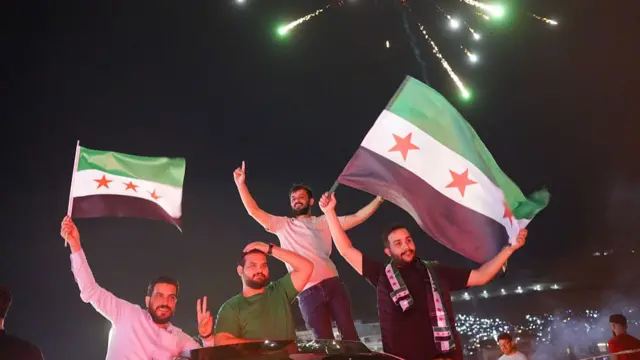
Only last year, the US offered a $10m reward for the Syrian leader’s arrest
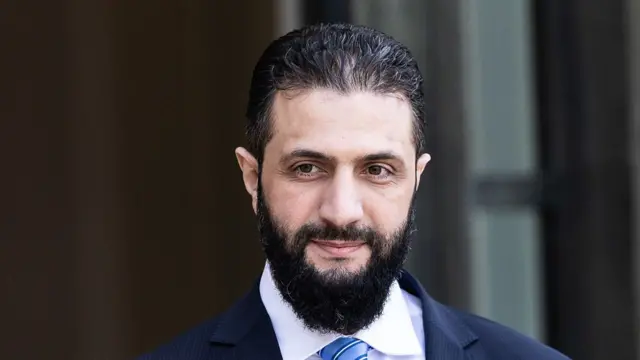
Syria’s transitional President Ahmed al-Sharaa formally took over a month after the rapid collapse of the Assad regime in December.
His forces led the coalition of militant groups in a swift campaign which toppled the brutal regime which ruled the war-torn nation for decades.
Previously, he was an al-Qaeda commander, but has since severed ties with the group. When he stepped into the role, Sharaa stressed that Syria’s new government faced a “heavy task and a great responsibility”.
After Bashar al-Assad’s overthrow, 90% of Syria’s population were left under the poverty line – and some violence continued with clashes between Islamist armed factions, security forces and fighters from the Druze religious minority.
There was also mass killings of hundreds of civilians from minority Alawite community in the western coastal region in March, during clashes between the new security forces and Assad loyalists.
The US move to lift sanctions yesterday has been met with positivity in Syria – and the meeting between al-Sharaa and US President Donald Trump will be the first time US and Syrian leaders have met since 2000.
It may represent a further thawing in relations between the two countries – after the US scrapped a $10m (£7.9m) reward for the arrest of Sharaa in December, following diplomatic meetings.